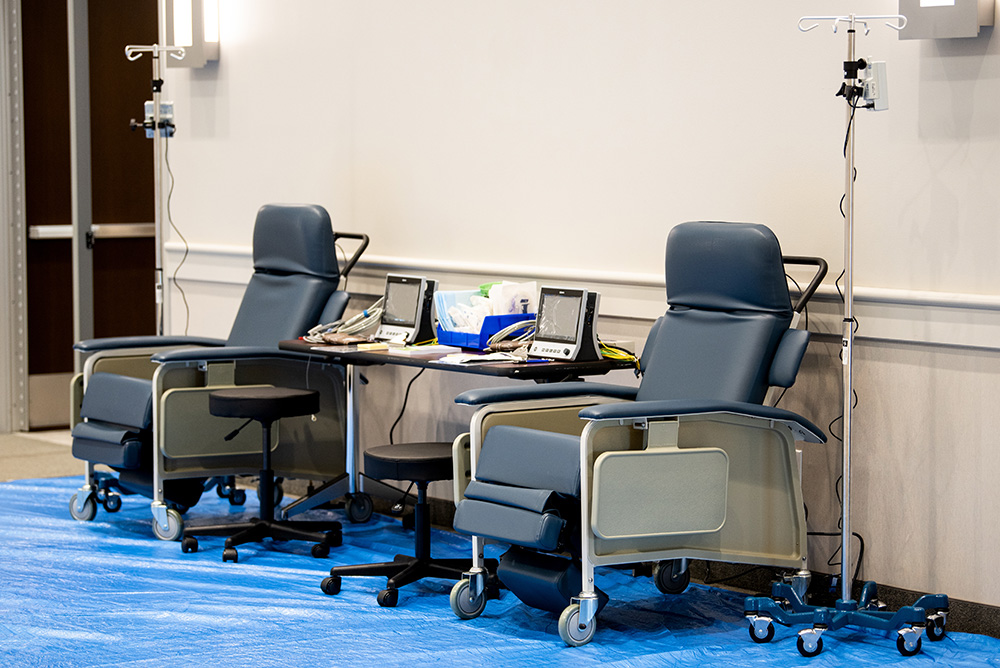Sept. 1, 2021 — A Regional Infusion Center to help treat COVID-19 patients in North Texas will open to the public this week in McKinney.
The Texas Division of Emergency Management, in partnership with Baylor Scott & White Health, Collin College, and Collin County, has provided the infusion center as an additional resource for treating COVID-19.
The state-supported infusion center will open to the public on Thursday, September 2. It will include personnel, equipment, supplies, and wraparound services for a 10-chair Regional Infusion Center.
“I’m grateful for our partnership with Collin College, Baylor Scott & White Health, and the Texas Division of Emergency Management,” said Collin County Judge Chris Hill. “They have been tremendous partners with Collin County throughout the pandemic, and our community is stronger because of their service and their leadership. This COVID-19 antibody infusion center is a welcome resource for our community.”
The Regional Infusion Center is located at Collin College at the McKinney Campus Conference Center, located at 2400 Community Avenue in McKinney, on the corner of Community Ave. and Taylor Burk. The patient entrance is located on the northwest side of the conference building.
“We are delighted to support our health care partners by making this facility available to the community,” said Dr. Neil Matkin, district president of Collin College. “We have a long-standing relationship with area hospitals, especially Baylor Scott & White Health, due to our extensive health sciences programs, and hosting this therapy center is yet another way we can support their service to local and regional residents.”
The facility will be open from 7 a.m. to 6 p.m. Monday-Saturday. Medical professionals will be able to administer a monoclonal antibody treatment to up to approximately 60 patients per day. Patients will be monitored after the infusion before being sent home to recuperate. The infusions are meant for COVID-19 patients who are not yet hospitalized or on oxygen supplements. The treatment is available at no cost to patients.
This state and local partnership helps expand access to antibody therapy that is proving to be an essential tool in helping keep COVID-19 patients out of the hospital. Partners supporting this effort include the Texas Division of Emergency Management, Collin County, North Central Texas Regional Advisory Council, Baylor Scott & White, and Collin College.
“Our team is happy to have been a conduit, connecting the appropriate parties between our hospitals, Collin County Judge Chris Hill, and Collin College,” said Jerri Garison, president of Baylor Scott & White Medical Center Plano and East Region. “Working together as a community is how we will beat this virus, and this infusion center will help.”
Patients are eligible for the medication when:
- Patient must NOT be hospitalized or require oxygen therapy.
- Patient must NOT require an increase in oxygen rate due to COVID-19 if using for underlying comorbidity.
- Patient MUST be within 10 days of symptom onset.
Patients can contact the infusion center by calling 972.548.6674. Doctors can contact the infusion center by emailing infusion@collin.edu.
Collin College serves more than 58,000 credit and continuing education students annually and offers more than 100 degrees and certificates, including new Bachelor of Science in Nursing (BSN) and Bachelor of Applied Technology (BAT) in Cybersecurity degrees. The only public college based in Collin County, Collin College is a partner to business, government and industry, providing customized training and workforce development. For more information, visit www.collin.edu.

